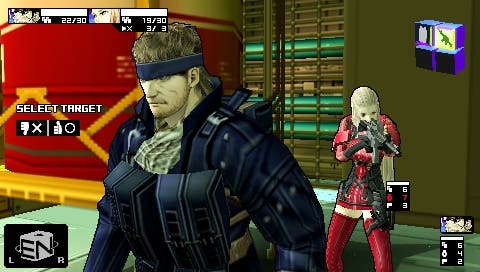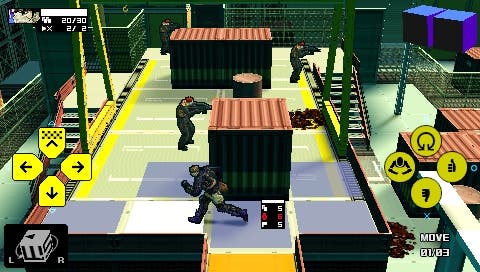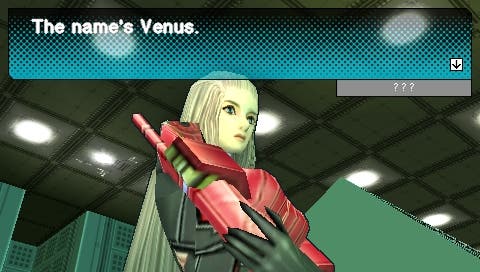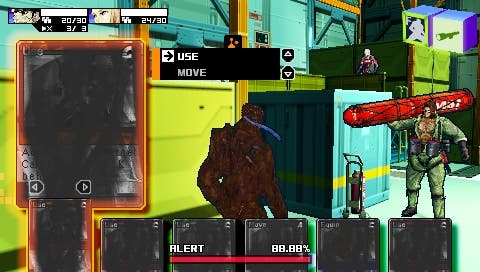Metal Gear Acid 2
Another solid turn from Snake's little brother.
Metal Gear Acid's a lot like riding a bike: once you've got the knack of it, it's fantastic fun. Although in this case, it's a lot like riding a bike using a Rubik's Cube instead of handlebars and pedals.
Yes, it's the return of Konami's Metal Gear spin-off (or shuffle-off perhaps), and things haven't changed a great deal. The underlying logic is still very much the same as Metal Gear Solid: you need to sneak between objectives making cunning use of your inventory of claymore mines, handguns, cardboard boxes and other knick-knacks, and if you're spotted by the guards or cameras the best thing to do is hide.
Except Metal Gear Acid is played out in turn-based fashion using cards to direct your actions. The majority of cards can be used to move a few squares across the grid-like play area, and all of them have some primary function that you can put to use in outwitting or downing guards and evading detection - guns chip away at health bars, boxes allow you to hide in plain view, and a range of booby-traps allow you to pop around the corner, bang your fist on the wall to attract a guard's attention, then giggle mischievously as someone stumbles along and explodes.
Metal Gear Acid 2 plays very much the same (sneaking) suit, with a few refinements. As with the original, each card has a Cost associated with it - a sort of time-currency that stacks up and binds you to the spot whenever it's the enemy's turn to move - but unlike the original game this time you can change the direction you're facing, lean up against a wall and move between crouching and standing to change your visibility without incurring a Cost penalty. Providing you do it at the end of a movement phase (well, there had to be a slightly fiddly catch).

You'll also notice that the fast-forward button, used to help speed up the boring process of watching five different guards patrol, has been hastened slightly, and coupled with an in-game explanation system that walks you through the concepts if you're ever unsure, it's not that hard to pick the game up from scratch and understand how it works properly without wasting too much time dithering about.
Of the bigger changes - i.e. the ones you'll have heard about - some work, but others prove a bit superficial. The Solid Eye for example, which allows you to play the game in sort-of 3D using special glasses, basically splits the screen into two images that come together in your head, but this is best reserved for use with the movie-viewer, where you can watch cinematics and things like the Metal Gear Solid 4 E3 trailer - because MGA2 isn't the sort of game that demands proper 3D and you'll probably just give yourself a headache if you persist with it.
There's also a new mode called Arena, which lets you face off against various characters drawn from different MGS games, and this provides a stern test initially before becoming a good bit easier once your deck's sufficiently tooled up. Really it's best for farming obscure cards. On top of that there's the option of linking up with Metal Gear Solid 3: Subsistence - providing Konami ever gets around to releasing that over here. We've certainly been waiting a while.
Then there's the story, which is obviously new, but certainly doesn't deviate from the classic MGS archetype. There's conspiracy and intrigue aplenty as Snake winds up in yet another installation watching and listening to the people around him play musical chairs with their motives and backgrounds, including a cast of silly boss characters who are more brute than brain. There's one who looks like the Hulk in a kilt and fires his fists at you from distance, while another packs a rocket launcher but doesn't appear to have a face. And of course there's a Metal Gear at the heart of it all and - surely this hasn't been done before - Solid Snake has amnesia! And is fighting to regain his memory!

Really, there are only a few other things that will draw the eye of Metal Gear Acid veterans. First, the addition of a new multiplayer mode. Again, we don't have two copies of the game so testing is impossible, but reports haven't been particularly favourable - the suggestion being that since you can see the other player at all times stealth's a bit redundant. The second New Big Thing is new female character, Venus, who turns up about a third of the way through and gives you another control option - on the same stages as Snake and all - and can generally use three cards per turn next to Snake's two. And the third thing, a hangover from Metal Gear Solid 3, is the useful addition of Close Quarters Combat (CQC) techniques - effectively a melee attack that you can use once per turn when you're in a square adjacent to an enemy, and given the right circumstances can knock him out for a spell.
On the whole though, it's Metal Gear Acid in a new setting, and that means that most of the same criticisms apply - along with praise to which it's entitled.
The card system fits into the Metal Gear canon surprisingly well - and that's largely thanks to familiar elements cleverly implemented. Alert and evasion phases, where you're under greater scrutiny and additional guards swarm in to look for you, are basically the same, while a range of status effects like improved accuracy, armour-piercing rounds and the like can be equipped in a similar manner to the way silencers and handguns could be combined in the MGS games' inventories. Either they fit into one of your equipment slots, or having them in your hand when you pull the trigger takes advantage of their attributes.
But that wasn't all I meant when I said "familiar elements" - I'm also referring to the dotty AI, famously capable of taking shots to the head and then going back to its patrol routes if it can't find you afterward within a minute and a half. With guards and robot sentries patrolling and cameras covering squares - all neatly shown up when you press triangle to go into free-view and float from object to object measuring up their lines of sight - you might imagine that the slightest mistake rapidly escalates into an inescapable dance of death, but no. Chances are that if a guard spots you you'll still have enough of a turn to incapacitate him or hide, and firing an unsilenced gun at an enemy on lower difficulties (even when they're audibly shouting "It's the enemy!" before you pull the trigger) doesn't seem to alert anybody who isn't already on your scent. If it sounds a bit dodgy, know that it is at times but that it's also part of The Rules, which you quickly ascertain and which are ultimately more help than hindrance; and admirable rather than ludicrous. And if you do want to be absolutely roasted every time you put a foot wrong, try the Extreme difficulty. Ulp.

Once you've got to grips with it, then, it's a game you'll happily play through more than once exploring the potential of unusual cards. We particularly like the ones based on MGS characters, like Roy Campbell's card, which initiates a massive airstrike attack for an admittedly heavy cost, and The Fury, one of the bosses from MGS3, who handily lends you his flamethrower for a bit of human toasting. And these are some of the very basic ones - we don't want to spoil all the unlockables, obviously. You can also upgrade cards and rearrange your deck in the slightly fiddly editor, and while it's a pain that you can't store multiple decks (besides one for Snake and one for Venus), it's definitely a game that rewards your attention to detail.
Then again it's also a bit of a poorer sibling to the MGS games in some sense - the story certainly isn't quite up to the level of Hideo Kojima's efforts. Say what you like about his writing, but the man handles his own implausible scripts (surely on special House Of Mirrors stationary) with a certain style that's won him a legion of fans. Some people loath the dodgy spirit-of-the-soldier soliloquies and endless codec conversations, but Metal Gear Acid 2's fault isn't that it does have these, it's that it does have them but the characters can be a bit goofy and incapable of the kind of silly pop-culture references and anal attention to plot and weapon detail that we've come to expect. Instead we've got B.B., a hacker with a smiley-face icon who jokes that it's all a bit like a video game and says "cool" a lot. Come back Raiden, all is forgiven.
MGA2 also hasn't done enough to sort out the original game's fiddliness. The system's unnecessarily laboured, the free-view camera is too high up and can only be moved to eight different angles (like the inside of an octagon) rather than zoomed in, the system of equipping certain weapons is hard to grasp initially and you can't do things like use the CQC techniques without initiating movement first. It's a shame that when the story interrupts you during a level, it also positions you standing in the middle of your square - whether you were crouched or sidling at the time or not - and it's also a bit ludicrous for a game where things can go wrong very quickly, and simply on the luck of the draw, that it still boots you out to the title screen when you save. It's crying out for a proper quick-save system. Purists may well hate the idea, but you could just turn it off for the harder difficulties.

Arguably worse is that while there's real pleasure to be had excising all the spinning bonus items from their hiding places, luring guards into your traps and giving people the slip, there are times when it all has to go wrong for things to progress and it doesn't really fit with the series' goals. This isn't Metal Gear Solid and perhaps it's unfair to labour the point, but when you've got no choice but to alert a guard to your whereabouts and then hope he succumbs to whatever amusing deaths your hand of cards can deal, it doesn't feel like much of a choice.
But then controlling a bike with a Rubik's Cube doesn't make much sense either. Which (since you're probably wondering) is a way of saying Metal Gear Acid 2's relationship with logic isn't always that obvious, but you get used to it, and once you do get your head around the various concepts that underwrite it all you might just get as much pleasure out of it as you did from Kojima's masterpieces. There are some excellent levels in here too. Using Venus and Snake in tandem is an interesting challenge, and when limited vision and interesting design elements like a train that rumbles past every 40 Cost come into play, MGA2's gripping enough to overcome any niggles. Slightly better than its predecessor, Metal Gear Acid 2 also sneaks a higher score, too.








